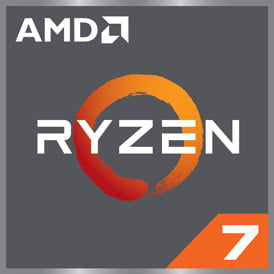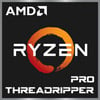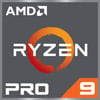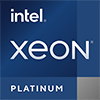
AMD Ryzen 7 7700 Benchmark, Test and specs
Last updated:
The AMD Ryzen 7 7700 was released in Q1/2023 and has 8 cores. The processor can process 16 threads simultaneously and uses a mainboard with the socket AM5 (LGA 1718). In the Geekbench 5 benchmark, the AMD Ryzen 7 7700 achieved a result of 2,177 points (single-core) or 14,026 points (multi-core).

| Name: | AMD Ryzen 7 7700 |
|---|---|
| Family: | AMD Ryzen 7 (67) |
| CPU group: | AMD Ryzen 7000 (14) |
| Architecture: | Raphael (Zen 4) |
| Segment: | Desktop / Server |
| Generation: | 6 |
| Predecessor: | -- |
| Successor: | -- |
CPU Cores and Base Frequency
The AMD Ryzen 7 7700 has 8 cores. The clock frequency of the AMD Ryzen 7 7700 is 3.80 GHz (5.30 GHz). An initial performance assessment can be made using the number of CPU cores.
| CPU Cores / Threads: | 8 / 16 |
|---|---|
| Core architecture: | normal |
| Cores: | 8x Zen 4 |
| Hyperthreading / SMT: | Yes |
|---|---|
| Overclocking: | Yes |
| Frequency: | 3.80 GHz |
| Turbo Frequency (1 Core): | 5.30 GHz |
| Turbo Frequency (8 Cores): | 4.60 GHz |
Internal Graphics
The AMD Ryzen 7 7700 has an integrated graphics that the system can use to efficiently play back videos. The AMD Ryzen 7 7700 has the AMD Radeon Graphics (Raphael) installed, which has 2 streaming multiprocessors (128 shaders).
| GPU name: | AMD Radeon Graphics (Raphael) |
|---|---|
| GPU frequency: | 0.40 GHz |
| GPU (Turbo): | 2.20 GHz |
| Compute units: | 2 |
| Shader: | 128 |
| Hardware Raytracing: | No |
| Release date: | Q3/2022 |
| Max. displays: | 3 |
|---|---|
| Generation: | 9 |
| Direct X: | 12 |
| Technology: | 5 nm |
| Max. GPU Memory: | 8 GB |
| Frame Generation: | No |
Hardware codec support
Processors with integrated graphics can process video codecs faster. Support for modern codecs can significantly increase system efficiency during video playback.
| h265 / HEVC (8 bit): | Decode / Encode |
|---|---|
| h265 / HEVC (10 bit): | Decode / Encode |
| h264: | Decode / Encode |
| VP8: | Decode / Encode |
| VP9: | Decode / Encode |
| AV1: | Decode |
|---|---|
| AVC: | Decode / Encode |
| VC-1: | Decode |
| JPEG: | Decode / Encode |
Memory & PCIeThe AMD Ryzen 7 7700 supports a maximum of 128 GB memory. Depending on the mainboard, the processor can use a maximum of 2 (Dual Channel) memory channels. This results in a maximum bandwidth of the main memory of 83.2 GB/s. |
|
| Memory type: | Memory bandwidth: |
|---|---|
| DDR5-5200 | 83.2 GB/s |
| Max. Memory: | 128 GB |
| Memory channels: | 2 (Dual Channel) |
| ECC: | Yes |
| PCIe: | 5.0 x 24 |
| PCIe Bandwidth: | 94.5 GB/s |
Thermal ManagementThe AMD Ryzen 7 7700 has a TDP of 65 W. Based on the TDP, the system manufacturer can and must adapt the cooling solution to the processor. |
|
|---|---|
| TDP (PL1 / PBP): | 65 W |
| TDP (PL2): | 88 W |
| TDP up: | 170 W |
| TDP down: | -- |
| Tjunction max.: | 95 °C |
Technical details
Modern production reduces the waste heat of a processor and increases its efficiency. The AMD Ryzen 7 7700 is made in 5 nm and has 40.00 MB cache.
| Technology: | 5 nm |
|---|---|
| Chip design: | Chiplet |
| Socket: | AM5 (LGA 1718) |
| L2-Cache: | 8.00 MB |
| L3-Cache: | 32.00 MB |
| AES-NI: | Yes |
| Operating systems: | Windows 10, Windows 11, Linux |
| Virtualization: | AMD-V, SVM |
|---|---|
| Instruction set (ISA): | x86-64 (64 bit) |
| ISA extensions: | SSE4a, SSE4.1, SSE4.2,FMA3, AVX2, AVX512 |
| Release date: | Q1/2023 |
| Release price: | -- |
| Part Number: | 100-100000592BOX |
| Documents: | Technical data sheet |
Rate this processor
Benchmark results

The benchmark results for the AMD Ryzen 7 7700 have been carefully checked by us. We only publish benchmark results that have been created by us or that have been submitted by a visitor and then checked by a team member. All results are based on and fullfill our benchmark guidelines.
Screenshots:
Screenshots:
Cinebench 2024 (Single-Core)
The Cinebench 2024 benchmark is based on the Redshift rendering engine, which is also used in Maxon's 3D program Cinema 4D. The benchmark runs are each 10 minutes long to test whether the processor is limited by its heat generation.

|
Apple M1
8C 8T @ 3.20 GHz |
||

|
Apple M1 Max (32-GPU)
10C 10T @ 3.20 GHz |
||

|
Intel Core i7-13700T
16C 24T @ 4.90 GHz |
||
|
|
AMD Ryzen 7 7700
8C 16T @ 5.30 GHz |
||

|
Intel Core i5-14500HX
14C 20T @ 4.90 GHz |
||

|
AMD Ryzen 7 7745HX
8C 16T @ 5.10 GHz |
||

|
AMD Ryzen 7 7800X3D
8C 16T @ 5.00 GHz |
||
Cinebench 2024 (Multi-Core)
The Multi-Core test of the Cinebench 2024 benchmark uses all cpu cores to render using the Redshift rendering engine, which is also used in Maxons Cinema 4D. The benchmark run is 10 minutes long to test whether the processor is limited by its heat generation.

|
AMD Ryzen 9 3900XT
12C 24T @ 4.70 GHz |
||

|
AMD Ryzen 9 3900X
12C 24T @ 4.60 GHz |
||

|
Apple M3 Pro (12-CPU 18-GPU)
12C 12T @ 4.06 GHz |
||
|
|
AMD Ryzen 7 7700
8C 16T @ 5.30 GHz |
||

|
Apple M2 Max (30-GPU)
12C 12T @ 3.50 GHz |
||

|
Apple M2 Max (38-GPU)
12C 12T @ 3.50 GHz |
||

|
Intel Core i7-12700F
12C 20T @ 4.90 GHz |
||
Cinebench R23 (Single-Core)
Cinebench R23 is the successor of Cinebench R20 and is also based on the Cinema 4 Suite. Cinema 4 is a worldwide used software to create 3D forms. The single-core test only uses one CPU core, the amount of cores or hyperthreading ability doesn't count.

|
Intel Core i7-12700K
12C 20T @ 5.00 GHz |
||

|
Intel Core i7-12700KF
12C 20T @ 5.00 GHz |
||

|
Intel Core i9-12900HK
14C 20T @ 5.00 GHz |
||
|
|
AMD Ryzen 7 7700
8C 16T @ 5.30 GHz |
||

|
AMD Ryzen 7 PRO 7745
8C 16T @ 5.30 GHz |
||

|
AMD Ryzen 9 7945HX3D
16C 32T @ 5.40 GHz |
||

|
Apple M3 Pro (12-CPU 18-GPU)
12C 12T @ 4.06 GHz |
||
Cinebench R23 (Multi-Core)
Cinebench R23 is the successor of Cinebench R20 and is also based on the Cinema 4 Suite. Cinema 4 is a worldwide used software to create 3D forms. The multi-core test involves all CPU cores and taks a big advantage of hyperthreading.

|
AMD Ryzen 9 5900
12C 24T @ 4.10 GHz |
||

|
AMD Ryzen 7 7700X
8C 16T @ 5.20 GHz |
||

|
Intel Core i9-12950HX
16C 24T @ 2.30 GHz |
||
|
|
AMD Ryzen 7 7700
8C 16T @ 4.60 GHz |
||

|
AMD Ryzen 7 PRO 7745
8C 16T @ 4.60 GHz |
||

|
Intel Core i9-12900HX
16C 24T @ 2.30 GHz |
||

|
AMD Ryzen Threadripper 1950X
16C 32T @ 3.50 GHz |
||
Geekbench 5, 64bit (Single-Core)
Geekbench 5 is a cross plattform benchmark that heavily uses the systems memory. A fast memory will push the result a lot. The single-core test only uses one CPU core, the amount of cores or hyperthreading ability doesn't count.

|
AMD Ryzen 7 7700X
8C 16T @ 5.40 GHz |
||

|
Intel Core i9-14900
24C 32T @ 5.80 GHz |
||

|
AMD Ryzen 5 7600X
6C 12T @ 5.30 GHz |
||
|
|
AMD Ryzen 7 7700
8C 16T @ 5.30 GHz |
||

|
AMD Ryzen 7 PRO 7745
8C 16T @ 5.30 GHz |
||

|
AMD Ryzen Threadripper 7970X
32C 64T @ 5.30 GHz |
||

|
Intel Core i9-14900HX
24C 32T @ 5.80 GHz |
||
Geekbench 5, 64bit (Multi-Core)
Geekbench 5 is a cross plattform benchmark that heavily uses the systems memory. A fast memory will push the result a lot. The multi-core test involves all CPU cores and taks a big advantage of hyperthreading.

|
Intel Xeon Gold 6238T
22C 44T @ 2.40 GHz |
||

|
AMD EPYC 7401
24C 48T @ 2.80 GHz |
||

|
Intel Xeon Gold 6208U
16C 32T @ 2.60 GHz |
||
|
|
AMD Ryzen 7 7700
8C 16T @ 4.60 GHz |
||

|
AMD Ryzen 7 PRO 7745
8C 16T @ 4.60 GHz |
||

|
AMD EPYC 7401P
24C 48T @ 2.80 GHz |
||

|
Intel Xeon Gold 6230R
26C 52T @ 2.30 GHz |
||
Geekbench 6 (Single-Core)
Geekbench 6 is a benchmark for modern computers, notebooks and smartphones. What is new is an optimized utilization of newer CPU architectures, e.g. based on the big.LITTLE concept and combining CPU cores of different sizes. The single-core benchmark only evaluates the performance of the fastest CPU core, the number of CPU cores in a processor is irrelevant here.

|
AMD Ryzen 9 7945HX3D
16C 32T @ 5.40 GHz |
||

|
AMD Ryzen Threadripper PRO 7965WX
24C 48T @ 5.30 GHz |
||

|
AMD Ryzen 9 7945HX
16C 32T @ 5.40 GHz |
||
|
|
AMD Ryzen 7 7700
8C 16T @ 5.30 GHz |
||

|
AMD Ryzen 7 PRO 7745
8C 16T @ 5.30 GHz |
||

|
Intel Core i9-13950HX
24C 32T @ 5.50 GHz |
||

|
AMD Ryzen 7 7800X3D
8C 16T @ 5.00 GHz |
||
Geekbench 6 (Multi-Core)
Geekbench 6 is a benchmark for modern computers, notebooks and smartphones. What is new is an optimized utilization of newer CPU architectures, e.g. based on the big.LITTLE concept and combining CPU cores of different sizes. The multi-core benchmark evaluates the performance of all of the processor's CPU cores. Virtual thread improvements such as AMD SMT or Intel's Hyper-Threading have a positive impact on the benchmark result.

|
Intel Core i5-13600
14C 20T @ 4.40 GHz |
||

|
AMD EPYC 7413
24C 48T @ 3.40 GHz |
||

|
AMD EPYC 7313P
16C 32T @ 3.40 GHz |
||
|
|
AMD Ryzen 7 7700
8C 16T @ 4.60 GHz |
||

|
AMD Ryzen 7 PRO 7745
8C 16T @ 4.60 GHz |
||

|
AMD Ryzen Threadripper 3970X
32C 64T @ 3.80 GHz |
||

|
Intel Core i9-13900T
24C 32T @ 3.90 GHz |
||
Cinebench R20 (Single-Core)
Cinebench R20 is the successor of Cinebench R15 and is also based on the Cinema 4 Suite. Cinema 4 is a worldwide used software to create 3D forms. The single-core test only uses one CPU core, the amount of cores or hyperthreading ability doesn't count.

|
Intel Core i7-12700K
12C 20T @ 5.00 GHz |
||

|
Intel Core i7-12700KF
12C 20T @ 5.00 GHz |
||

|
AMD Ryzen 9 7945HX3D
16C 32T @ 5.40 GHz |
||
|
|
AMD Ryzen 7 7700
8C 16T @ 5.30 GHz |
||

|
AMD Ryzen 7 PRO 7745
8C 16T @ 5.30 GHz |
||

|
AMD Ryzen Threadripper 7980X
64C 128T @ 5.10 GHz |
||

|
Intel Core i5-12600KF
10C 16T @ 4.90 GHz |
||
Cinebench R20 (Multi-Core)
Cinebench R20 is the successor of Cinebench R15 and is also based on the Cinema 4 Suite. Cinema 4 is a worldwide used software to create 3D forms. The multi-core test involves all CPU cores and taks a big advantage of hyperthreading.

|
Intel Core i5-13500
14C 20T @ 4.20 GHz |
||

|
AMD Ryzen 7 7700X
8C 16T @ 5.20 GHz |
||

|
AMD Ryzen 7 PRO 7745
8C 16T @ 4.60 GHz |
||
|
|
AMD Ryzen 7 7700
8C 16T @ 4.60 GHz |
||

|
Intel Core i9-7980XE
18C 36T @ 3.50 GHz |
||

|
Intel Core i9-9980XE
18C 36T @ 4.00 GHz |
||

|
AMD EPYC 7601
32C 64T @ 2.70 GHz |
||
iGPU - FP32 Performance (Single-precision GFLOPS)
The theoretical computing performance of the internal graphics unit of the processor with simple accuracy (32 bit) in GFLOPS. GFLOPS indicates how many billion floating point operations the iGPU can perform per second.

|
Apple A12 Bionic
Apple A12 @ 1.13 GHz |
||

|
MediaTek Dimensity 820
ARM Mali-G57 MP5 @ 0.90 GHz |
||

|
Qualcomm Snapdragon 835
Qualcomm Adreno 540 @ 0.71 GHz |
||
|
|
AMD Ryzen 7 7700
AMD Radeon Graphics (Raphael) @ 2.20 GHz |
||

|
AMD Ryzen 5 PRO 7645
AMD Radeon Graphics (Raphael) @ 2.20 GHz |
||

|
AMD Ryzen 7 PRO 7745
AMD Radeon Graphics (Raphael) @ 2.20 GHz |
||

|
AMD Ryzen 9 PRO 7945
AMD Radeon Graphics (Raphael) @ 2.20 GHz |
||
Estimated results for PassMark CPU Mark
Some of the CPUs listed below have been benchmarked by CPU-monkey. However the majority of CPUs have not been tested and the results have been estimated by a CPU-monkey’s secret proprietary formula. As such they do not accurately reflect the actual Passmark CPU mark values and are not endorsed by PassMark Software Pty Ltd.

|
Intel Core i9-13900E
24C 32T @ 4.20 GHz |
||

|
Intel Core i9-12950HX
16C 24T @ 2.30 GHz |
||

|
Intel Core i9-12900HX
16C 24T @ 2.30 GHz |
||
|
|
AMD Ryzen 7 7700
8C 16T @ 4.60 GHz |
||

|
AMD Ryzen 7 PRO 7745
8C 16T @ 4.60 GHz |
||

|
Intel Xeon Gold 6326
16C 32T @ 3.30 GHz |
||

|
Intel Xeon Platinum 8180
28C 56T @ 2.80 GHz |
||
CPU performance per watt (efficiency)
Efficiency of the processor under full load in the Cinebench R23 (multi-core) benchmark. The benchmark result is divided by the average energy required (CPU package power in watts). The higher the value, the more efficient the CPU is under full load.

|
AMD Ryzen 7 8700G
18,040 CB R23 MC @ 83 W |
||

|
AMD Ryzen 7 PRO 8700G
18,040 CB R23 MC @ 83 W |
||

|
Intel Core i9-13900H
18,760 CB R23 MC @ 87 W |
||
|
|
AMD Ryzen 7 7700
19,540 CB R23 MC @ 92 W |
||

|
AMD Ryzen 5 PRO 8600G
14,067 CB R23 MC @ 68 W |
||

|
AMD Ryzen 5 8600G
14,067 CB R23 MC @ 68 W |
||

|
AMD Ryzen 7 7800X3D
17,762 CB R23 MC @ 87 W |
||
Benchmarks

Cinebench 2024 (SC)
272 entries
272 entries

Cinebench 2024 (MC)
271 entries
271 entries

Cinebench R23 (SC)
586 entries
586 entries

Cinebench R23 (MC)
565 entries
565 entries

Geekbench 5 (SC)
2,488 entries
2,488 entries

Geekbench 5 (MC)
2,461 entries
2,461 entries

Geekbench 6 (SC)
1,755 entries
1,755 entries

Geekbench 6 (MC)
1,703 entries
1,703 entries

Cinebench R20 (SC)
656 entries
656 entries

Cinebench R20 (MC)
604 entries
604 entries

FP32 SP (iGPU)
2,042 entries
2,042 entries

3DMark Timespy (iGPU)
516 entries
516 entries

PassMark CPU-Mark
2,392 entries
2,392 entries

CPU performance per watt (efficiency)
109 entries
109 entries
Description of the processor
The AMD Ryzen 7 7700 is a fast mid-range processor for AMDs AM5 socket, which is actually completely sufficient for all computer games. Since it has 8 CPU cores (16 threads), it is also suitable for more demanding applications. The eight CPU cores are based on the AMD Zen 4 CPU architecture, which relies on CPU cores of the same size.The base clock of the AMD Ryzen 7 7700 is 3.8 GHz, the clock frequency can be increased to up to 5.3 GHz using the dynamic turbo mode. If all CPU cores are utilized, the clock frequency is a maximum of 4.6 GHz. How high the clock frequency is is primarily determined by the energy consumption and the CPU temperature.
AMD Radeon Graphics is used as the iGPU (internal graphics) with only two execution units. Although this is based on AMDs RDNA2 architecture for graphics cards, due to the limitation to only two execution units and 128 texture shaders, this iGPU is too slow to play computer games smoothly. The graphics unit is only used for image output; a dedicated graphics card should be used for more demanding games or applications.
The AMD Ryzen 7 7700 supports up to 128 GB of DDR5-5200 memory. In dual-channel mode, a maximum memory bandwidth of 83.2 GB/s can be achieved using at least two memory modules. Unofficially, even higher RAM clock frequencies are possible using AMD EXPO technology; DDR5-6000 is often mentioned as the sweet spot here.
The AMD Ryzen 7 7700 provides 24 PCIe 5.0 lines. A fast dedicated graphics card can be connected to this, as well as fast M.2 SSDs and other devices.
The TDP of the AMD Ryzen 7 7700 is 65 watts, with a maximum of 88 watts allowed. Since the processor can be freely overclocked, many motherboards even support 170 watts. However, the AMD Ryzen 7 7700 doesnt need/exploit this at all.
Popular comparisons
back to index




